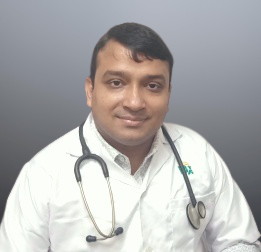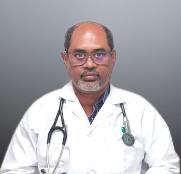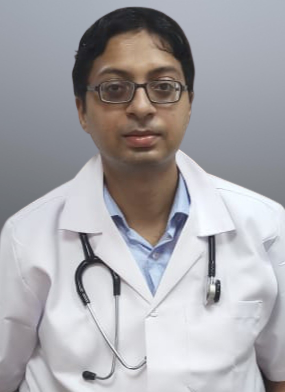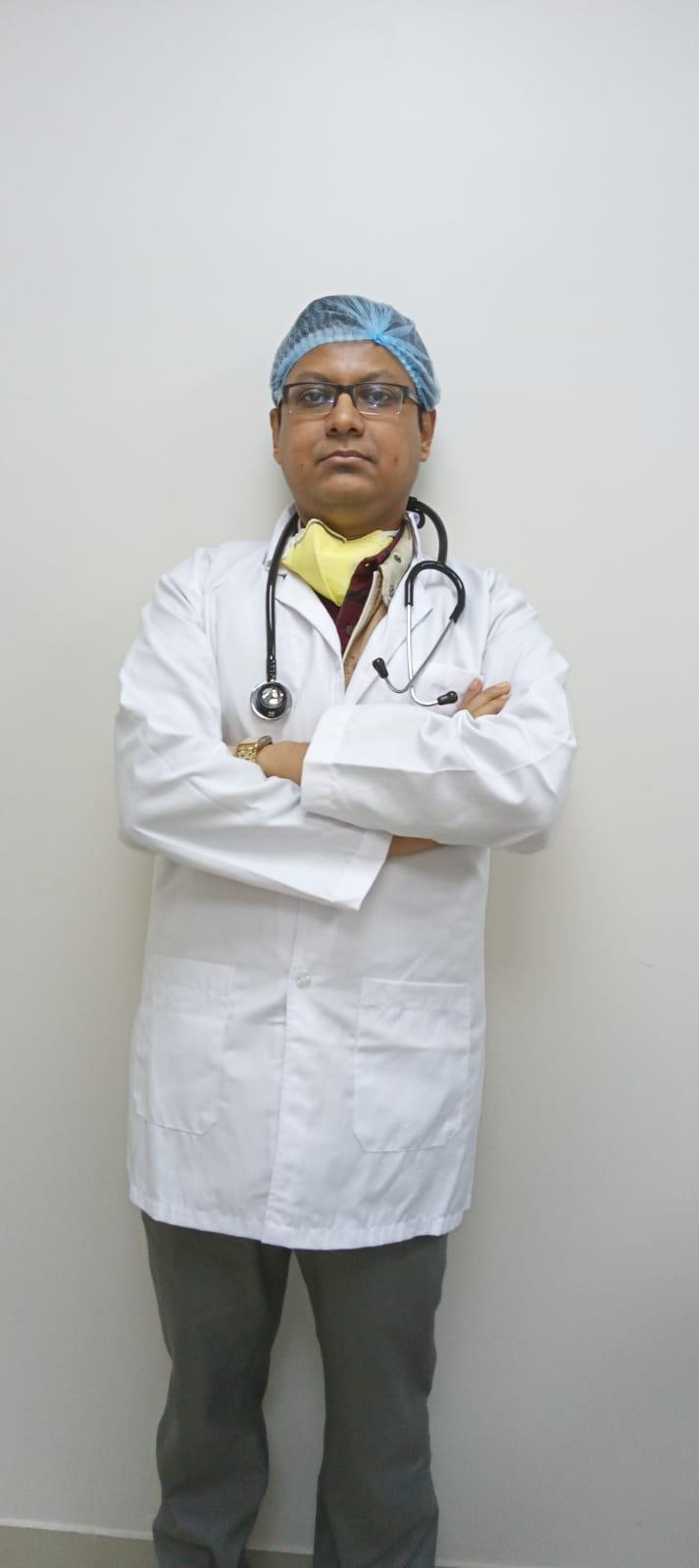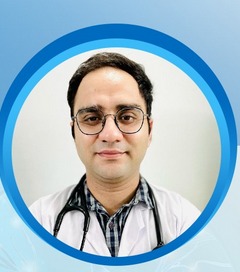Search Result: 20

Dr Amitabha Ghosh
MBBS,MD(Med),MRCP(UK), CCST(Neurology)UK,FRCP(London),FRCP(Edin)
Registration No
4259
Language
English, বাংলা, हिंदी

28 years experience overall

Canal Circular Road , Kolkata
SUN- SAT(12:00 PM-12:01 PM)

Dr Debabrata Chakraborty
MD (General Medicine ), DM (Neurology), Fellow Stroke and Cerebrovascular diseases (University of Calgary, Canada)
Registration No
2238954
Language
English, বাংলা, हिंदी, ଓଡ଼ିଆ

14 years experience overall

Canal Circular Road , Kolkata
MON- SAT(01:00 PM-02:00 PM)

Dr Kishalaya Karan
MBBS,MD(Gen Medicine), DM (Neurology)
Registration No
4837900
Language
English, বাংলা, हिंदी

10 years experience overall

Canal Circular Road , Kolkata
SUN- SAT(12:00 PM-12:01 PM)

Dr Manoj Kumar Mahata
MBBS, MD(General Medicine), DM (Neurology), Fellowship in Neuroendovascular Therapy, European Diploma in Ischemic Stroke Intervention & Fellowship in Pain Management
Registration No
6086518
Language
English, বাংলা, हिंदी

12 years experience overall

Canal Circular Road , Kolkata
SUN- SAT | SUN- SAT(12:00 PM-12:01 PM | 12:00 PM-12:05 PM)

Dr Sadanand Dey
MD,DM (Neuro), Fellow Stroke and Cerebrovascular diseases from University of Calgary, Canada
Registration No
2242635
Language
English, বাংলা, हिंदी

9 years experience overall

Canal Circular Road , Kolkata
MON, TUE, THU, FRI(01:00 PM-03:00 PM)

Dr Sanjay Bhaumik
MD,DM
Registration No
3110290
Language
English, বাংলা, हिंदी

24 years experience overall

Canal Circular Road , Kolkata
TUE- FRI(11:00 AM-12:00 PM)

Dr Sarbajit Das
MBBS,MD,DM(NEUROLOGY)
Registration No
4799714
Language
English

11 years experience overall

Canal Circular Road & Kolkata , Kolkata
MON- SAT(12:00 PM-12:01 PM)

Dr Aditya Choudhary
MBBS, MD (Medicine) DM(Neurology)-PGI CHANDIGARH,Dip Public Health, MRCP (1)
Registration No
2136031
Language
English, বাংলা, हिंदी

10 years experience overall

Salt Lake , Kolkata
MON, WED, SAT(04:30 PM-06:00 PM)

Dr Amar Kumar Misra
MBBS,MD
Registration No
4033467
Language
English, বাংলা, हिंदी

34 years experience overall

Thakurpukur , Kolkata
TUE(05:00 PM-06:30 PM)

Dr Arindam Ghosh
MBBS,MD,DM
Registration No
4449888
Language
English

14 years experience overall

Kolkata , Kolkata
SAT(04:00 PM-06:00 PM)

Dr Dhiman Das
MBBS,MD, DM (Neuro)
Registration No
635605
Language
English

4 years experience overall

Narendrapur , Kolkata
TUE(06:30 PM-07:00 PM)

Registration No
644726
Language
English

10 years experience overall

Salt Lake , Kolkata
THU, SAT(04:00 PM-06:00 PM)

Dr Goutam Das
MBBS, DPM, MD (Medicine), DM (Neurology)
Registration No
861277
Language
English

26 years experience overall

Barrackpore , Kolkata
FRI(06:00 PM-07:30 PM)

Dr Jayanta Chakraborty
FCCP,DIP NEURO
Registration No
1044516
Language
English, বাংলা, हिंदी

27 years experience overall

Near Fire brigade , Kolkata
TUE, WED(08:00 AM-10:00 AM)

Dr Koushik Pan
MD, DM NEUROLOGY,MBBS
Registration No
4073179
Language
English, বাংলা

20 years experience overall

Sarat Bose Road , Kolkata
MON, SAT(02:00 PM-03:00 PM)

Dr Koustav Jana
MBBS MD DM
Registration No
5970271
Language
English

11 years experience overall

Sodepur , Kolkata
MON(11:00 AM-12:00 PM)

Dr Major Jayanta Chakraborty
MBBS, FCCP, D NEURO
Registration No
4061035
Language
English, हिंदी

12 years experience overall

Birati , Kolkata
MON(07:00 PM-08:00 PM)

Dr Subhasis Maitra
MBBS,MD.DM
Registration No
3965927
Language
English, বাংলা, हिंदी

21 years experience overall

Thakurpukur , Kolkata
MON, THU | FRI(02:00 PM-03:00 PM | 11:00 AM-12:00 PM)

Dr Vaibhav Seth
MBBS MD(MED.) DM(NEURO)
Registration No
5846411
Language
English

4 years experience overall

Kolkata , Kolkata
MON, WED(06:30 PM-07:30 PM)
Frequently Asked Questions for s in
In most cases, cerebral palsy is not genetic. It is usually caused by a combination of factors such as prenatal brain damage or birth complications. However, there are rare genetic factors that can lead to cerebral palsy.
Tests used to diagnose cerebral palsy include brain imaging (MRI or CT scan) to assess brain abnormalities, neurological examination to evaluate muscle tone and reflexes, and developmental assessments to monitor milestones and identify delays.
Risk factors for cerebral palsy include multiple pregnancies (twins or triplets), premature birth, low birth weight, maternal infections during pregnancy, exposure to toxins during pregnancy, and certain genetic conditions.
Cerebral palsy does not necessarily affect intelligence. The level of cognitive impairment varies widely among individuals with cerebral palsy. Some may have normal intelligence, while others may have intellectual disabilities.
Yes, cerebral palsy can affect speech. Some individuals with cerebral palsy may have difficulty controlling the muscles necessary for speaking, resulting in speech impairments. Speech therapy can help improve communication skills.
Common symptoms include delayed milestones, abnormal muscle tone (either too stiff or too floppy), difficulty with fine motor skills, poor coordination, balance issues, and tremors or involuntary movements. However, symptoms vary depending on the severity and type.
Cerebral palsy affects movement and coordination because of damage to parts of the brain that control muscle tone, posture, and movement. This leads to difficulties in coordinating muscles, making precise movements, and maintaining balance.
Yes, cerebral palsy is a lifelong condition. However, with appropriate treatment and therapies, individuals with cerebral palsy can lead fulfilling lives and improve their independence and functioning.
Damage to the developing brain before, during, or after birth can cause cerebral palsy. Common causes include oxygen deprivation, infections during pregnancy, premature birth, low birth weight, head injuries, and certain genetic factors. Early diagnosis and intervention are essential for improving outcomes for individuals with cerebral palsy.
The three main types are spastic cerebral palsy (difficulty inmovements and stiff muscles), dyskinetic cerebral palsy (involuntary and uncontrolled movements), and ataxic cerebral palsy (poor coordination and balance).
Cerebral palsy is diagnosed through a combination of physical examination, medical history review, and diagnostic tests such as brain imaging (MRI or CT scan). Evaluation by specialists helps determine the type and severity of cerebral palsy.
If you notice delayed milestones in your child’s development, such as not rolling over or sitting up by 6 months or not walking by 18 months, it is important to consult a doctor. Other signs include abnormal muscle tone, poor coordination, or involuntary movements.
A paediatric neurologist is usually involved in the diagnosis and management of cerebral palsy. They work closely with healthcare professionals, including physical therapists, occupational therapists, speech therapists, and orthopaedic surgeons.
In some cases, addressing risk factors during pregnancy and childbirth can prevent cerebral palsy. This includes receiving proper prenatal care, avoiding infections during pregnancy, managing high blood pressure or diabetes, and preventing premature birth.
Treatment for cerebral palsy focuses on managing symptoms and improving quality of life. It includes physical, occupational, and speech therapy; medications to control muscle spasms; and orthopaedic interventions like braces or surgery if necessary.
Other Specialities in Kolkata
- Best Urologist in Kolkata
- Best Pulmonologist in Kolkata
- Best General Physician in Kolkata
- Best Endocrinologist in Kolkata
- Best Cardiologist in Kolkata
- Best Oncologist in Kolkata
- Best Radiologist in Kolkata
- Best Orthopedics in Kolkata
- Best Hepatologist in Kolkata
- Best Gynecologist in Kolkata
- Best Dermatologist in Kolkata
- Best Gastroenterologist in Kolkata
- Best Psychologist in Kolkata
- Best Ent Specialist in Kolkata
- Best Nephrologist in Kolkata
- Best Rheumatologist in Kolkata
- Best Diabetologist in Kolkata
- Best Psychiatrist in Kolkata
- Best Neonatologist in Kolkata
- Best Dentist in Kolkata
- Best Dietitian in Kolkata
- Best Haematologist in Kolkata
- Best Pediatrics in Kolkata
- Best General Surgeon in Kolkata
Top Hospitals in India
- Hospitals in Ahmedabad
- Hospitals in Bangalore
- Hospitals in Bhubaneswar
- Hospitals in Bilaspur
- Hospitals in Chennai
- Hospitals in Delhi
- Hospitals in Guwahati
- Hospitals in Hyderabad
- Hospitals in Indore
- Hospitals in Kolkata
- Hospitals in Madurai
- Hospitals in Mumbai
- Hospitals in Mysore
- Hospitals in Nashik
- Hospitals in Noida
- Hospitals in Visakhapatnam
- Hospitals in Lucknow
- Hospitals in Bhopal
- Hospitals in Karur
- Hospitals in Kochi
- Hospitals in Nellore
- Hospitals in Trichy
- Hospitals in Kakinada
© Copyright 2024. Apollo Hospitals Group. All Rights Reserved.



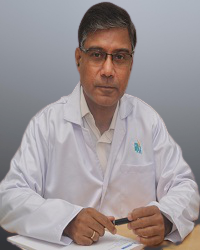
 Call Now
Call Now


